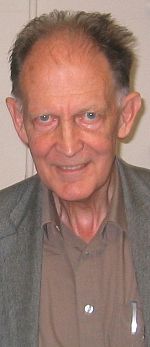Obituary: Dr David Walton
Organic chemist Dr D. R. M. (Dave) Walton died on Saturday (3 May) at the age of 77 after a very long illness.
 Dr David Walton
Dr David Walton
He went to school in Southend, obtained his degrees from London and Leicester, came to Sussex in 1964 as a research fellow, then became lecturer and reader before retiring in 2002.
He worked on organosilicon compounds with Colin Eaborn, the first professor of chemistry at Sussex, and helped to establish the reputation for world-class research in organometallic chemistry, in the early days of the University.
Later he and his students provided some of the key data on polyalkynes (linear arrays of carbon atoms) that Harry Kroto was looking for in outer space. He contributed to Harry’s work on C60 and its derivatives and provided advice and support to graduate students during Harry’s many journeys around the world.
His work was recognised in the award of the prestigious Bader Award of the Royal Society of Chemistry in 2001 “for his fundamental interdisciplinary contributions to the synthesis of carbon-based materials and inorganic nanostructures, and for his elucidation of self-assembly mechanisms”.
He also made innovative contributions to teaching. He ran the MSc course in Organometallic Chemistry from its inauguration in 1965 to 1974. He was the first chemistry representative on the Science and Europe Programme, initiated by John Venables after the 1975 referendum on membership of the European Community. This was intended to provide scientists, fluent in at least two languages, with first-hand experience in European research, and attracted some of the best students to come to Sussex.
He was an intrepid worldwide traveller, and arranged for students or technicians from numerous countries to come to Sussex to gain experience or qualifications. He had a canny way of talking to civil servants, especially from the Foreign and Commonwealth Office, and extracting development grants from them.
He helped to establish a new university at Batticaloa in the Tamil-speaking area of Sri Lanka and made many visits and extended stays in the process. He recognised the importance of language in development of mutual understanding and, with the help of Sri Lankan colleagues, developed a Tamil-Sinhalese-English word-processor. Sadly, much of his work was lost in the civil war.
He founded the journal Transition Metal Chemistry in 1975 and remained as Editor in Chief until 2007. He spent many hours correcting manuscripts from authors whose first language was not English.
He was a hardworking and reliable colleague, held in high regard by all.
He is survived by his wife Carole, who worked in the Institute of Development Studies (IDS) on campus, and by a daughter and a son.
Dr David Smith, Chemistry
